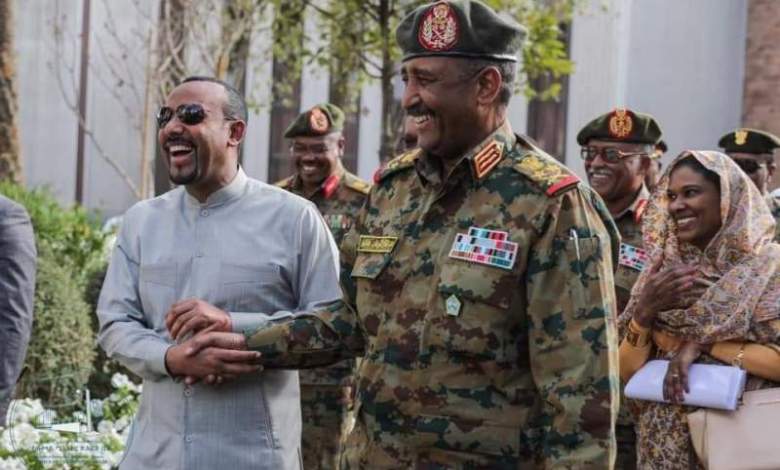Among the capitals of the Horn of Africa, Addis Ababa seems to be the closest to understanding the Sudanese psyche and mentality, and vice versa. This is due to historical reasons that left their effects deep, the extent of which is unknown to those who spent an age floundering in the glories of the past and trying in vain to reach after losing their bearings. Yes, Addis Ababa seems to be the closest to the Sudanese psyche and mentality, with what it suffers from injustice and old resentment that came as a result of two things, no third:
The first thing: Sudan’s loss of the ancient city of Halfa, which included the greatest civilizations in the world after it was submerged to build the High Dam and the displacement of the people of Halfa in 1964, which caused the loss of the identity of an entire people.
The second matter: Sudan’s pride in its Arab identity was faced with explicit Arab denial. This denial was enough to cause Sudan to withdraw into itself for decades. That period established many of the buried psychological components that cannot be seen with the naked eye, but can be reached and felt in the eyes of its people. This is what I found before me throughout my extended stay in Sudan, and this is what Ethiopia places before it when dealing with Sudanese files. It is the same thing that governs part of the dimensions of Sudanese-Ethiopian relations, which represent for us as Gulf citizens a point from which we begin with those parties, reaching a stage of future transformation that we aspire to be a part of. The recent escalation of Sudanese-Ethiopian tension came in parallel with the escalation of official statements between representatives of the two countries in Arab and foreign capitals, but those statements did not find a popular echo in (Addis Ababa, Khartoum). We did not witness popular mobilization, electronic campaigns, and television programs like those we witnessed during the Gulf crisis, for example. This in itself carries a positive connotation that can only be understood by those who understand the dimensions of those relations between the two countries. Ethiopia realizes that the developments taking place inside Sudan are linked to what has been reflected in its relationship with Khartoum. Just as Addis Ababa realizes that all the tensions on its borders with Sudan today are temporary and temporary, it certainly realizes that Khartoum will not find a “real” supporter for it in most files like Ethiopia. It is conscious and intelligent not to lose it, especially since there is a general Sudanese feeling that does not see Ethiopia as an opponent, even if some try to promote that. This is what reassures Addis Ababa, which is fully aware that Sudan is not willing to clash with it, does not aspire to it, and does not want to continue it. However, these are the intersections that have been found. In some Sudanese men, it is a pasture in which it lives, so they began to apply it right and left as if they were the ones who created it and it was not imposed on them, and the painful thing is that they will reap nothing in return.
With the success of Ethiopian Prime Minister Abiy Ahmed in defeating the rebellion in the Tigray region, Addis Ababa appeared more steadfast than before and more convincing to international powers. The administration of President Joe Biden, despite its denunciation of the violations committed by the Ethiopian army in the Tigray region, realized without stating that its reliance on a young Ethiopian leadership capable of controlling the balances in its region and restoring calm to its depths deserves praise, even implicitly. This is what terrified parties that see the Ethiopian rise as an excess that may result in the loss of arms that were contributing to fueling its rebellion, so it was necessary to work on returning tension to the Ethiopian interior, but this time with Sudan, which is returning strongly to the international community.
What reassures Addis Ababa today is that the new US administration is flexible, but there are those who bet that the appointment of Yohannes Abraham, an American of Ethiopian origin (Tigray ethnicity), in President Joe Biden’s administration as Executive Secretary of the US National Security Council may affect the US administration’s position towards the Ethiopian regime, but I do not see that as likely, as President Joe Biden’s administration wants to continue what the administration of former President Barack Obama started, and let’s not forget that the African Growth and Opportunity Act (AGOA) began as an initiative by the Democratic Party in 2000 to help the economies of sub-Saharan Africa, and that law witnessed advanced activation during the era of President Barack Obama, and thus this will be the goal of the new US administration that aspires to a different role in the Horn of Africa and Sudan, as the return of the US embassy with its full staff to Mogadishu after thirty years of estrangement, the lifting of sanctions on Sudan, and normalization with Israel – all these changes are enough to give birth to a different strategy that the Horn of Africa region will witness. But what if a military confrontation occurs between Addis Ababa and Khartoum? How will the Horn of Africa countries view this confrontation?
The Federal Republic of Somalia: Mogadishu will remain neutral and will demand self-restraint, but it is certain that Mogadishu, deep down, is leaning towards Khartoum. It is known that there is an old Somali resentment towards Addis Ababa, no matter how hard Mogadishu tries to hide it. It is true that the administration of President Mohamed Farmajo tried to overcome this and succeeded to some extent in finding rapprochement with the government of Abiy Ahmed, but it certainly did not forget the Ethiopian role that exhausted Somalia and brought it to where it is today, not to mention Ethiopian support for Kenya. Addis Ababa and Nairobi share in the occupation of the Somali regions (Ogaden and Enfidi), so it is not surprising that they adopt similar views. They were joined by the “Somaliland region”, which aspires to independence from the Federal Republic of Somalia. Nairobi and Addis Ababa are using this region to trouble Mogadishu, and the question here remains: for how long?
What really surprises me is Addis Ababa’s view of the Somali file. Is it possible that a country the size of Ethiopia does not realize that Somalia has become an international destination today and the US administration is working to give it a larger space in the future? Doesn’t Addis Ababa see these international and regional moves towards Somalia, which has become a destination for anyone who has a conscious strategic vision that is not based on money as much as it is based on the ABCs of collective work to win the Somali people over before their leadership? Is it possible that the Ethiopian leadership, after all the stations, slips, successes and political, security and intelligence failures it has gone through, is still betting that provoking Somalia is still easy by moving the card of the regions?
Republic of Djibouti: I believe that Djibouti, even if its vision for some files has changed, will remain a trusted ally of Ethiopia, and Djibouti knows that what Ethiopia and Sudan are going through will end without it showing a binding position towards what is happening or will happen in the future.
Eritrea: Isaias Afwerki realizes that the ambition of the young Ethiopian Prime Minister Abiy Ahmed goes beyond eliminating the rebellion in the Tigray region. Abiy Ahmed believes that he has become a representative of Ethiopia’s future and the bearer of the banner of its renaissance. Therefore, he must have stations and arrivals that will be engraved in the memory of the Ethiopian people. This is what Isaias Afwerki will not allow, as he cooperates with everyone to bring them down, especially since Isaias will find someone who stands with him to move forward in getting rid of a young man whose ambition may kill him, or this is how he is viewed. At the same time, Isaias exploits these conditions to strangle the comrades of his former rival (Omar al-Bashir). Isaias Afwerki, despite his old hostility to Sudan and former President Omar al-Bashir, realizes that those leading the scene in Sudan today are al-Bashir’s men, some of whom are loyal to him no matter what happens. Therefore, I do not see cooperation between Asmara and Khartoum as central, but rather a formal cooperation necessitated by the current circumstances, and it will remain so unless Isaias Afwerki disappears from the scene. The escalating tension between Sudan and Ethiopia will not develop into a military confrontation as some hope, plan or even anticipate, but its outbreak may grant medals and progress that those seeking to rule Sudan in the future need. However, the Sudanese street is aware of one fact, which is that those seeking to rule Sudan will not achieve political weight that qualifies them to rule in the future except by recovering Halaib and Shalateen, and anything less than that is sheer nonsense, especially since the Fashaga region, despite our not disagreeing about its Sudanese nature, Khartoum, just as it realizes that it did not recover it until after the security situation on the Sudanese-Ethiopian border collapsed and the accompanying disturbances represented by the mass displacement to eastern Sudan, it also realizes that there is a big difference between Sudanese lands that the previous Sudanese leadership agreed to give voluntarily to a certain party for a specific period, and Sudanese lands that were forcibly occupied to impose a fait accompli as a result of a political clash. The question here remains: if the Ethiopian Tigray region had not rebelled, would Fashaga have returned to the embrace of the motherland? Or will her return be linked to a dialogue table between Addis and Khartoum, in which the explanation will be long and the wait will be long?
The head of the Sudanese Sovereignty Council, Lieutenant General Abdel Fattah Al-Burhan, realizes that he is in a situation that must impose itself on the Sudanese reality after the rise of the star of “Mohamed Hamdan Dagalo”, nicknamed “Hemedti”, about whom we said in a previous article entitled (Sudan between compliance and retreat) and published in June 2019 that the competition between Al-Burhan and Hemedti will take a different form, especially since “Hemedti” will not be satisfied with removing Al-Burhan and will not hesitate to remove everyone, as his thirst for power will not stop even after he crosses the threshold of the Republican Palace.
The article is published in the Mogadishu Center for Research and Strategic Studies at the following link
Dr. Amina Al-Arimi
Emirati researcher in African affairs


No Comments